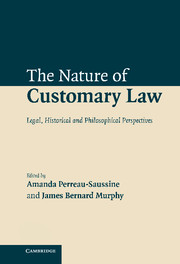Book contents
- Frontmatter
- Contents
- List of contributors
- Table of cases
- The character of customary law: an introduction
- Part I Custom and morality: natural law, customary law and ius gentium
- 1 Pitfalls in the interpretation of customary law
- 2 The moral role of conventions
- 3 Habit and convention at the foundation of custom
- 4 Custom, ordinance and natural right in Gratian's Decretum
- 5 Vitoria and Suarez on ius gentium, natural law, and custom
- 6 Custom and positivity: an examination of the philosophic ground of the Hegel–Savigny controversy
- Part 2 Custom and law: custom, common law and customary international law
- Index of names
1 - Pitfalls in the interpretation of customary law
Published online by Cambridge University Press: 30 June 2009
- Frontmatter
- Contents
- List of contributors
- Table of cases
- The character of customary law: an introduction
- Part I Custom and morality: natural law, customary law and ius gentium
- 1 Pitfalls in the interpretation of customary law
- 2 The moral role of conventions
- 3 Habit and convention at the foundation of custom
- 4 Custom, ordinance and natural right in Gratian's Decretum
- 5 Vitoria and Suarez on ius gentium, natural law, and custom
- 6 Custom and positivity: an examination of the philosophic ground of the Hegel–Savigny controversy
- Part 2 Custom and law: custom, common law and customary international law
- Index of names
Summary
Much has been written on the legal status of customary law, but considerably less attention has been devoted to the question of determining the content of the customary law whose legal status (or not) is at issue. Like any other source of law, customary law presents the question of interpreting, applying, and enforcing the emanations from that source, but interpreting customary law – or interpreting the custom that is to be part of the law – presents issues arguably more complex than those presented when we are considering the interpretation of constitutions, statutes, regulations, treaties, and even the common law. My goal here is to explore these interpretive questions, and to do so with perhaps somewhat of a skeptical attitude. This is not to say that such skepticism will turn out at the end of the day to be justified. It is to believe, however, that addressing such skeptical questions is an inevitable task for any satisfactory account of the role of customary law in common law adjudication, and perhaps to an even greater extent with respect to the role of customary international law as a part of international law more generally. So, although in this paper I will ask more questions than I answer, my goal is to put on the table those interpretive issues that anyone seeking to develop a theory of customary international law, or a theory of the role of custom in common law decision-making, must at least attempt to answer.
- Type
- Chapter
- Information
- The Nature of Customary LawLegal, Historical and Philosophical Perspectives, pp. 13 - 34Publisher: Cambridge University PressPrint publication year: 2007
- 7
- Cited by



